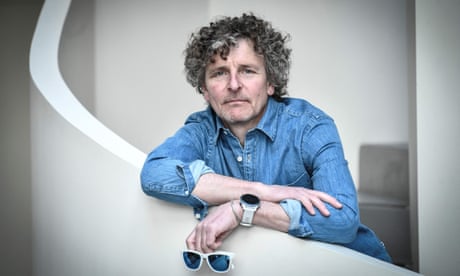- by foxnews
- 10 Mar 2025
Michael Horvath: the Strava co-founder who’s pacing himself
Michael Horvath: the Strava co-founder who’s pacing himself
- by theguardian
- 02 May 2022
- in technology

Michael Horvath took up hiking and yoga during the pandemic when his usual cycle to work was off limits. Like almost 100 million others in nearly 300 countries he was able to track his chosen activities on Strava - the app for sporty types he co-founded 13 years ago.
Conceived as a "virtual locker room" through which cyclists could compete against their mates, the app boomed during the pandemic as millions of people looked at ways to get active and join online clubs that would inspire them to keep going.
At the peak in April and May 2020, the app saw 3 million people a month joining - triple its previous level. That has since slipped back to 2 million a month, but Horvath believes the app could reach 1 billion users within a decade.
On the horizon now is a move to get the business on stock market leaderboards, as the pandemic, and now a fuel crisis, drive a permanent shift towards physically active travel.
In the UK, already 17% of the adult population is on the platform, or more than 9 million people. "What the pandemic did in a lot of ways has accelerated what would have happened already but forced it to happen sooner and gave us the space to think about it. It is happening in the next couple of years instead of 10 years from now," says Horvath.
He wants Strava to be a tool to help continue to drive that change, with data from its cyclists and walkers' activities used to help design and validate rejigs of town and city centres.
Since 2020, the app has been making its data available free to local authorities and public bodies, including Transport for London, Transport for Greater Manchester and Active Travel England; now more than 1,500 such bodies are using it, compared with just 50 pre-pandemic.
Horvath says Strava decided offering free data was better for the company in the long run because it would help more people get active and become potential app users.
For example, the number of female cyclists joining Strava more than doubled during the first year of the pandemic, as, it appears, women felt safer taking to the streets as protected bike lanes popped up around the country and cars stayed at home.
"Anecdotally, look at San Francisco, Paris, London and Stockholm, where I've spent some time recently since the pandemic. The pandemic not only created more sense of demand from people who live in these cities but also the supply increased too. We saw immediately how city authorities responded by creating quieter streets and repurposing streets to serve the people," Horvath says.
He says there has been a drift back to more car use but believes local authorities will nevertheless continue to invest in "enabling people to move through cities under their own power".
Horvath believes getting involved with improving towns and cities is "incredibly important" in motivating the group's 350 staff, and also gives Strava's clientele another reason to sign up and map and share their routes.
He says finding new ways to create a sense of camaraderie and fun - and offer more services, such as tips on where to get active on holiday or ways to monitor non-active health concerns such as sleep and nutrition - will help drive the company's future growth.
The app has already extended from just cycling to 33 activities, including rock climbing, surfing and using a wheelchair, and links to more than 30 devices which measure performance, from Garmin and Fitbit activity trackers to Peloton exercise bikes.
"We focus on building things athletes love to use - and hopefully find things they will pay for so business will thrive," Horvath says.
That format - offering a certain amount free with premium services accessed via subscription (of �4 a month in the UK) - was a key part of Horvath's reinvention of Strava. He stepped back in as chief executive of the then loss-making business in 2019, after five years out to care for his four children and terminally ill wife.
"It was pretty clear [the business] was not financially sound and needed to make changes and I stepped back in," he says.
The reinvention also included extra security measures, which he says focus on providing better education around the app's controls and automatic privacy zones around the start and finish of journeys amid concerns over safety, particularly for women. The app gained notoriety in 2018 for revealing sensitive information about military bases thanks to staff logging their exercise routines on Strava's app.
Horvath says he was partly motivated to return to the company by a desire to realise a vision partly influenced by his wife Anna, whom he married when they were both in their early 20s and who died in 2017. The business was practically part of the family, first mooted with co-founder Mark Gainey as a way to virtually recreate the camaraderie, and competition, of the Harvard rowing club where they met in the 1980s.
Horvath and Gainey first pitched the idea of a "virtual locker room" in the mid-1990s, but it generally received a negative response. Instead, the pair made a fortune by developing consumer-services software firm Kana, which they floated in 1999. Horvath tried to return to teaching, but yearned for the entrepreneurial life. By 2008, he and Gainey were meeting up for brainstorming sessions that would result in the birth of Strava. The arrival of phones with GPS and activity tracking technology such as Garmin put muscle behind an idea that had been dismissed more than a decade before.
However, it was the sporty revolution seen during the pandemic which gave Strava booster rockets, with revenues soaring 70% last year to about �170m, 90% of which came from subscriptions and the rest mostly from sponsorship deals with brands. It was the second year of growth at that pace, which helped deliver Strava's first profit in 2020.
Horvath says he is keen on seeking a public listing for the group, which was valued at $1.5bn when it raised $100m in November 2020 from investors including Sequoia Capital, which has backed the likes of PayPal and Zoom. But he doesn't appear to be in a rush to follow the tech firms, including DoorDash, Roblox and Deliveroo, who cashed in on their own pandemic booms.
"I do see it as something we'll do in the future," he says of public listing, "as a way to ensure longevity, [protect the] foundation we've built and do certain things we can't do as a private company. But it has to be done at the right time. It is not an end itself; it is a means to an end.
"We are trying to build the No 1 sports brand for the 21st century with technology and with digital experience. Not with shirts and shoes and gear but with something that fits into the way people are active in the 21st century. By enabling people to build a community they stay engaged their whole life. We want to be the record of the world's activities."
- by foxnews
- descember 09, 2016
Ancient structure used for cult 'rituals' discovered by archaeologists
A Neolithic Timber Circle was discovered by archeologists in Denmark resembling the historical landmark Stonehenge in the U.K. It is open to be viewed by the public.
read more





